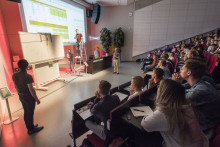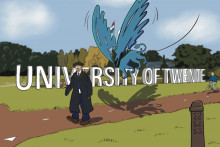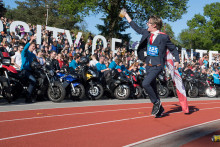The two universities already started a joint bachelor's programme in Mechanical Engineering in the city of Amsterdam in 2019. Now the programmes Creative Technology and Industrial Engineering & Management will follow. The two studies are set to start in 2023. In addition, the two universities are looking into the possibility of offering more joint bachelor's programmes in the near future, both in Amsterdam and Enschede.
With this cooperation, the VU and the UT want to connect the northern part of the Randstad with the eastern part of the Netherlands, says university president Victor van der Chijs. 'Together we can overcome the shortcomings of the two regions. In 2019 we started with Mechanical Engineering in Amsterdam, because students in the Randstad hardly ever opt for a technical study programme. That has to do with the availability in the region. Apparently, there is not the natural reaction to hop on the train to a technical university. It would be a shame if this technical talent were to be lost for the Netherlands. That's why the UT and the VU are jointly bringing technical studies to Amsterdam.’
Master influx
The UT, for its part, hopes that the cooperation will increase the influx of Master's students. The influx has been a problem in Twente for years. ‘In the east of the Netherlands, there is a huge deficit in talent at this level,' says Van der Chijs. In order to increase the influx of students, the two universities intend to match the bachelor's programmes at the VU more closely to the master's programmes at the UT. ‘The idea is that bachelor's students from the Randstad will then be more inclined to choose a master's in Twente.’
A first concrete step is the joint Master's specialisation in Sports Data Science in Twente, which will start next academic year. The universities also want to cooperate more closely in the near future in the area of research and valorisation. ‘Within the faculties, we have explored ways of doing this,’ says Van der Chijs. ‘Several projects have already resulted from this. There is great enthusiasm. But we are expanding the cooperation step by step, also with regard to the work pressure at our universities.’






